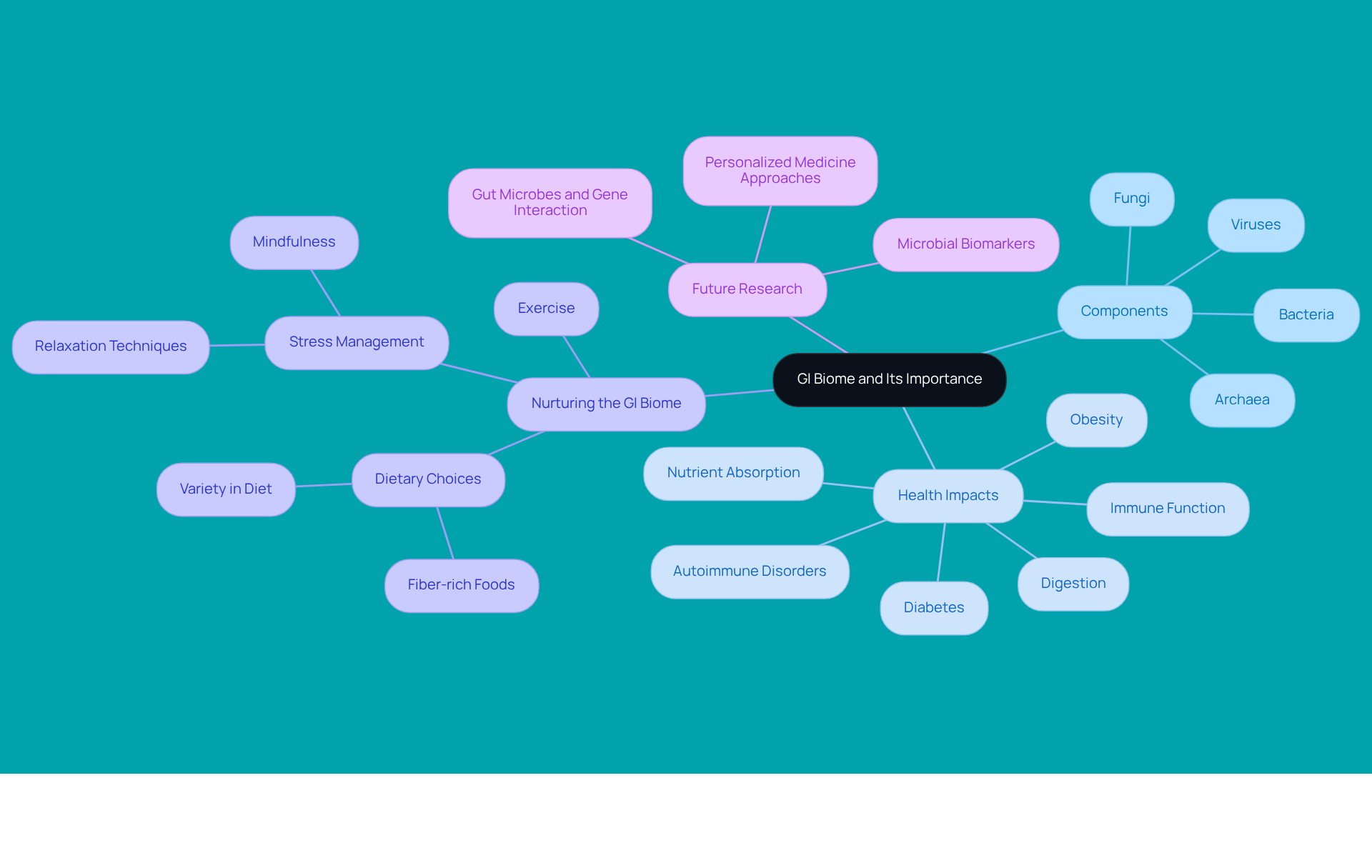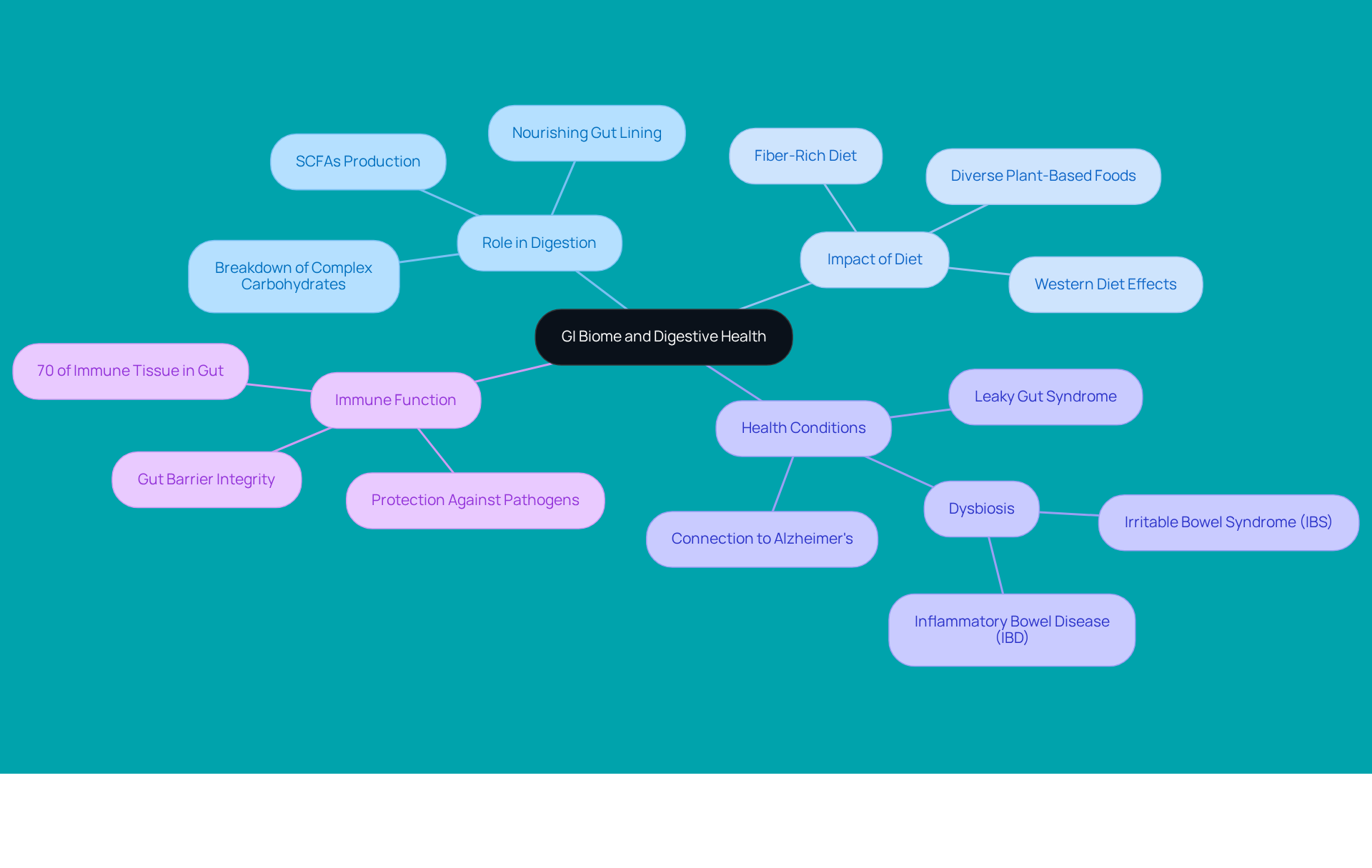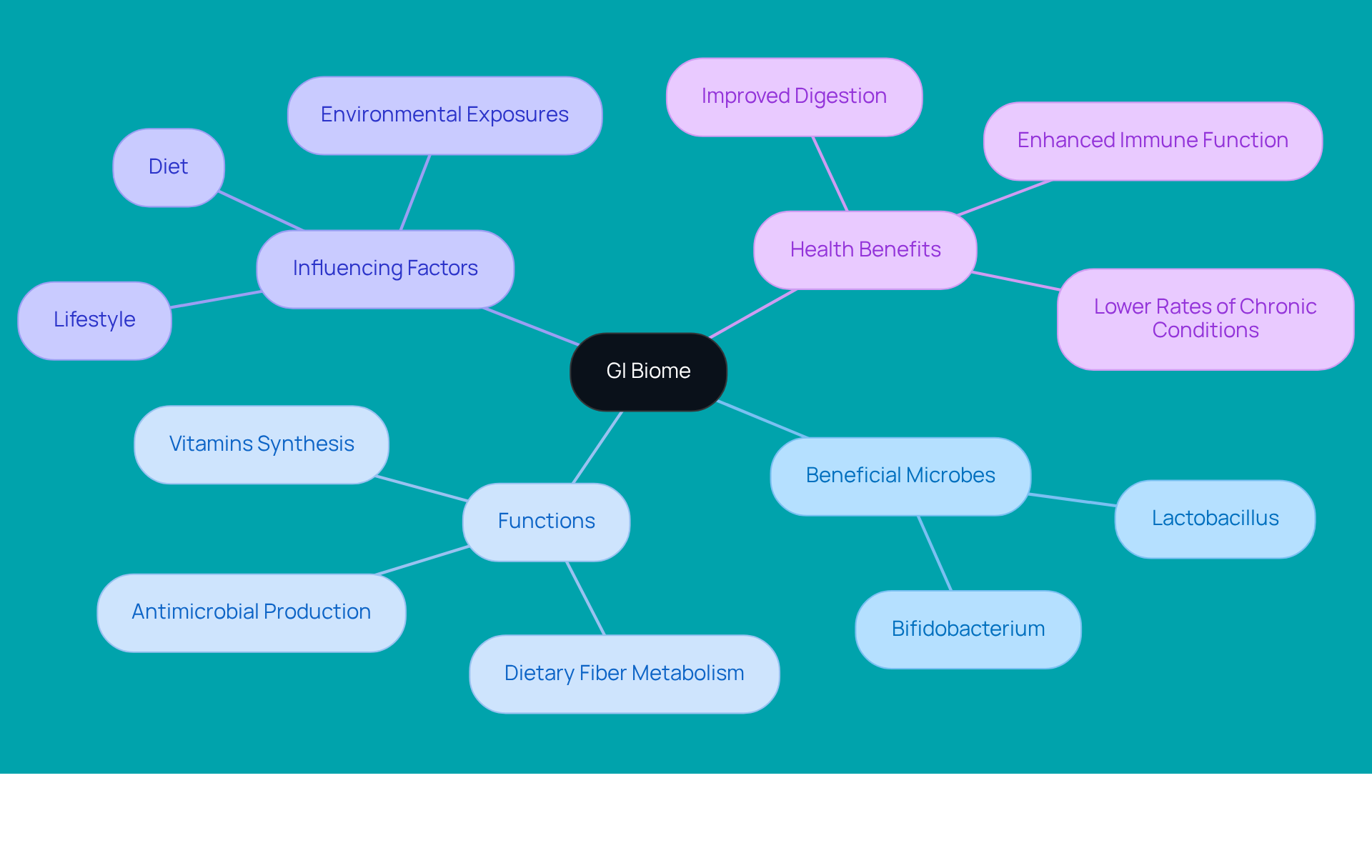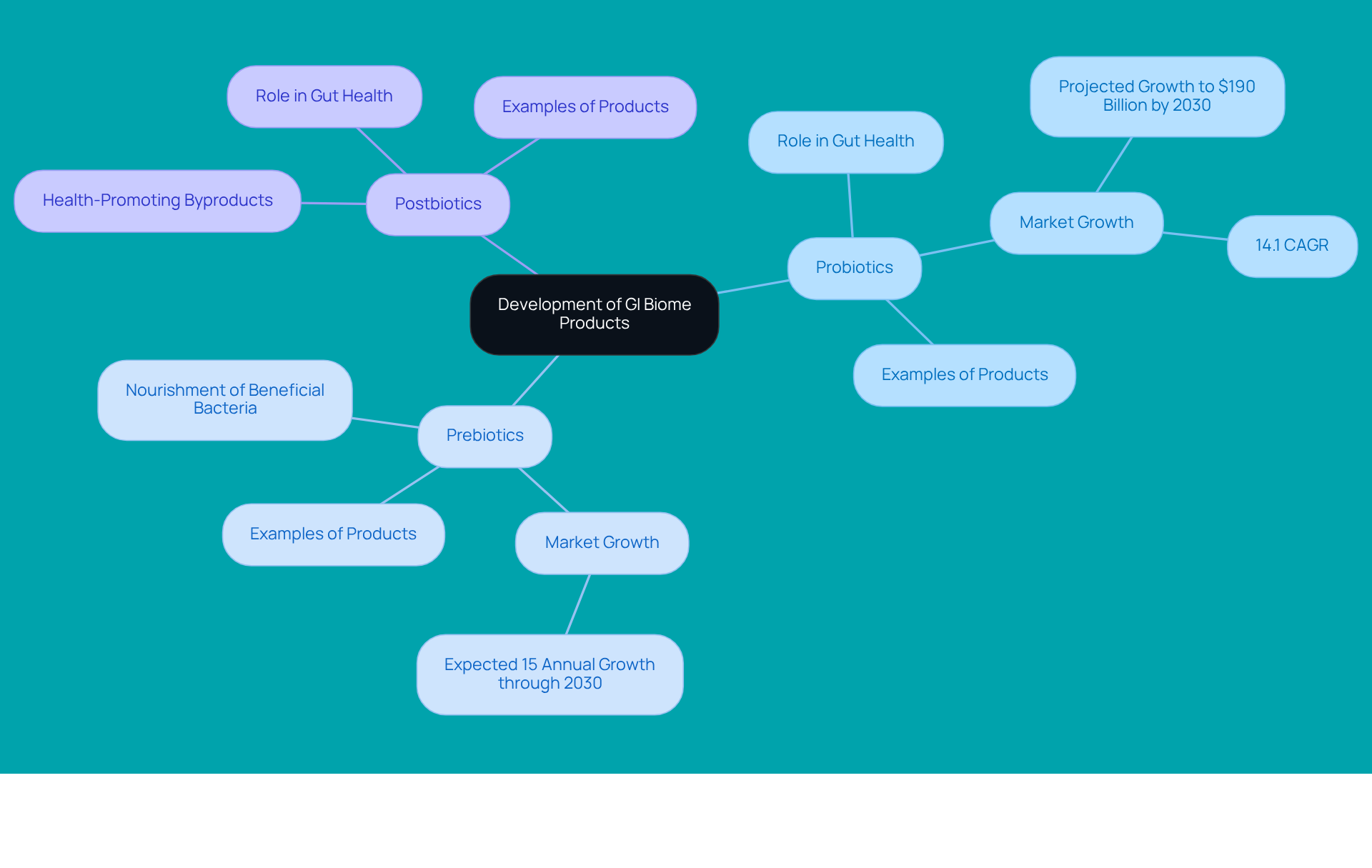Overview
The GI biome plays a vital role in our overall health, serving as a diverse community of microorganisms that support digestion, nutrient absorption, and immune function. You may not realize it, but this intricate system influences conditions like obesity and diabetes, affecting many of us today.
Imagine nurturing a balanced GI biome through mindful dietary choices and lifestyle practices. This can significantly enhance metabolic regulation and protect against chronic diseases. It’s a powerful reminder of how interconnected gut health is with our overall wellness.
As you reflect on your own health journey, consider the small steps you can take to support your GI biome. Together, we can embrace these changes and work towards a healthier future. Your journey to better health starts with understanding the importance of your gut. Let’s take this step together!
Introduction
The gastrointestinal (GI) biome is not just a collection of microorganisms; it represents a fascinating and intricate ecosystem that plays a pivotal role in our health. It influences everything from digestion to immune function, and understanding it is essential for our well-being.
As we become more aware of gut health, many of us find ourselves grappling with how to nurture this complex community effectively. You might be wondering, what steps can we take to optimize our GI biome? How can we enhance our health through this understanding?
In this article, we will delve into the significance of the GI biome, exploring its essential components and the profound impact it has on our overall wellness. Together, let’s discover ways to support this vital aspect of our health journey.
Define GI Biome and Its Importance
The gastrointestinal (GI) biome, often referred to as the digestive ecosystem, encompasses a complex community of microorganisms—bacteria, viruses, fungi, and archaea—that reside within our digestive tract. This intricate ecosystem is vital for digestion, nutrient absorption, and immune function. The importance of the GI biome is profound; it influences not only our digestive health but also our overall wellness, affecting conditions such as obesity, diabetes, and autoimmune disorders. A balanced GI biome is essential for maintaining well-being, as it aids in regulating metabolism, strengthening the immune system, and protecting against harmful pathogens.
Imagine if you could improve your health simply by nurturing your gut! Recent studies show that individuals with a diverse gut microbiome often enjoy better weight management and a reduced risk of diabetes. Research demonstrates that maintaining a healthy GI biome can enhance metabolic regulation and support the immune system, while disruptions in this GI biome balance may increase vulnerability to harmful pathogens and chronic diseases. Experts emphasize that understanding the interactions between gut microbes and human health can lead to innovative strategies for disease prevention and treatment. Alika K. Maunakea, a co-author of a significant study, shares, "By understanding how gut microbes influence our genes, we can begin to imagine new ways to prevent disease and enhance well-being in a manner that gets us closer to personalized medicine."
So, how can you nurture your GI ecosystem? Consider adopting mindful eating practices by incorporating a variety of fiber-rich foods—think fruits, vegetables, and whole grains—into your diet to support microbial diversity. Additionally, managing stress through relaxation techniques and regular exercise can further enhance your gut health. By making thoughtful dietary and lifestyle choices, you can foster the GI biome, which is crucial for promoting long-term wellness. Excitingly, new studies even suggest a connection between gut microorganisms and mental wellness, including aspects like postpartum depression. Together, let's take these steps towards a healthier, more vibrant life!

Explore the Role of GI Biome in Digestive Health
The gastrointestinal (GI) microbiome plays a vital role in our digestive well-being. It assists in breaking down complex carbohydrates and fibers that our bodies cannot process on their own. Imagine the beneficial bacteria working diligently to ferment these substances, producing short-chain fatty acids (SCFAs) that nourish our gut lining and help regulate inflammation. A healthy gastrointestinal microbiome also supports the integrity of the gut barrier, preventing leaky gut syndrome, which can lead to systemic inflammation and various wellness issues. Significantly, did you know that 70% of our immune tissue resides in the gut? This highlights the essential function of the GI biome in our overall well-being.
To maintain optimal GI function, it's crucial to keep a balanced microbial population. Dysbiosis, characterized by an imbalance of gut microorganisms, can lead to digestive disorders such as irritable bowel syndrome (IBS) and inflammatory bowel disease (IBD). Gastroenterologists emphasize that a diverse gut microbiome is key to effective digestion and overall health. For instance, certain advantageous microorganisms not only enhance nutrient uptake but also provide protection against harmful pathogens and conditions like Alzheimer's.
Current research underscores how our dietary choices shape the gastrointestinal (GI) biome. A diet rich in fiber and diverse plant-based foods fosters the growth of beneficial bacteria, which in turn supports the production of SCFAs. This relationship reinforces the importance of nutrition in sustaining gut well-being and preventing digestive disorders. As Eugene B. Chang, MD, wisely states, "Food can be medicinal and prescriptive, influencing gut microbiome populations and functions." This insight reminds us that our food choices are crucial for gut health recovery, especially after antibiotic treatment, where a Western-style diet has been shown to increase susceptibility to infections. Therefore, adopting a diverse and fiber-rich diet is essential for nurturing a healthy gut microbiome. Together, we can take steps toward better gut health and overall wellness.

Examine the Components and Functionality of GI Biome
The gi biome is a remarkable ecosystem, home to trillions of microorganisms, with beneficial microbes like Lactobacillus and Bifidobacterium taking center stage due to their probiotic properties. These tiny allies are essential for maintaining gut health, as they help synthesize vital vitamins, metabolize dietary fibers, and produce antimicrobial substances that inhibit the growth of harmful microbes. Imagine if you could boost your immune function and protect yourself from harmful bacteria simply by nurturing these beneficial microorganisms. Current research shows that Lactobacillus species can indeed enhance immune responses, while Bifidobacterium is linked to improved digestion and relief from gastrointestinal disorders.
You might be wondering how to support this complex biome. The functionality of your gi biome is significantly influenced by various factors, including diet, lifestyle, and environmental exposures. A diverse gi biome is often linked to better health outcomes, enhancing resilience against illnesses and supporting essential metabolic functions. For instance, studies reveal that individuals with a rich variety of gut bacteria tend to experience lower rates of chronic conditions, such as obesity and inflammatory bowel disease. This highlights the importance of maintaining a balanced and diverse gi biome for your overall well-being.
Together, we can focus on nurturing our gut health. By making mindful dietary choices and embracing a lifestyle that supports microbiome diversity, we can pave the way for a healthier future. Let’s take this journey towards better wellness, one step at a time.

Trace the Origins and Development of GI Biome Products
The development of products related to the GI biome reflects a growing awareness of the microbiome's vital role in our overall health. Initially, the focus was primarily on probiotics, which aimed to introduce beneficial microorganisms into our gut. However, as research has advanced, the scope has broadened to include:
- Prebiotics, which nourish these helpful bacteria
- Postbiotics, the health-promoting byproducts of microbial fermentation
This evolution reveals a deeper understanding of the GI biome's complexity and its intricate interactions with our diet and wellness.
You might be wondering about the variations in healthy microbiome profiles across different populations. This highlights the importance of tailored solutions that cater to our individual gut ecosystems. Today, we see a strong demand for a diverse range of supplements and functional foods designed to enhance gut well-being, aligning with the broader trend towards holistic wellness solutions.
Imagine if you could find products specifically designed for your unique gut health needs. Advanced targeted delivery systems are now improving the efficacy of gut health products, ensuring that active ingredients reach specific gut regions for maximum impact. As the probiotics market is projected to grow significantly, reaching over $190 billion by 2030, and the prebiotics market is expected to expand at 15% annually through 2030, brands are increasingly innovating to create tailored products. This shift emphasizes the importance of addressing our individual gut ecosystems in the GI biome rather than relying on one-size-fits-all formulations.
Together, we can embrace this journey towards better gut health, exploring the options that resonate with our personal wellness goals.

Conclusion
The GI biome is a vital ecosystem within our bodies, playing a crucial role in digestion, nutrient absorption, and overall health. Understanding its complexity and the diverse microorganisms it houses allows us to appreciate the profound impact a balanced gut microbiome has on our wellness.
Consider how maintaining a healthy GI biome can be achieved through mindful dietary choices. Incorporating fiber-rich foods and managing stress are essential steps we can take. The connection between gut health and conditions like obesity, diabetes, and even mental wellness highlights the importance of nurturing this ecosystem. Additionally, the evolution of GI biome-related products—such as probiotics, prebiotics, and postbiotics—reflects a growing recognition of our need for tailored solutions that cater to our individual gut health requirements.
As our understanding of the GI biome continues to evolve, it’s essential for us to take proactive steps toward fostering a healthy gut. Imagine embracing a diverse diet, exploring innovative gut health products, and recognizing the intricate relationship between gut microorganisms and our overall health. By prioritizing gut health, we can unlock the potential for enhanced physical and mental wellness. Together, let’s make informed choices that benefit our unique microbiomes and pave the way for improved well-being.
Frequently Asked Questions
What is the GI biome?
The GI biome, or gastrointestinal biome, is a complex community of microorganisms—including bacteria, viruses, fungi, and archaea—that reside within our digestive tract. It plays a crucial role in digestion, nutrient absorption, and immune function.
Why is the GI biome important?
The GI biome is vital for maintaining overall wellness. It influences digestive health and is linked to conditions such as obesity, diabetes, and autoimmune disorders. A balanced GI biome helps regulate metabolism, strengthen the immune system, and protect against harmful pathogens.
How does a diverse gut microbiome affect health?
Individuals with a diverse gut microbiome often experience better weight management and a reduced risk of diabetes. A healthy GI biome enhances metabolic regulation and supports the immune system, while imbalances can increase vulnerability to chronic diseases.
What are some ways to nurture the GI biome?
To nurture the GI biome, one can adopt mindful eating practices by incorporating a variety of fiber-rich foods, such as fruits, vegetables, and whole grains, into their diet. Additionally, managing stress through relaxation techniques and regular exercise can further enhance gut health.
Are there any connections between gut health and mental wellness?
Yes, recent studies suggest a connection between gut microorganisms and mental wellness, including aspects like postpartum depression. This highlights the importance of gut health not only for physical well-being but also for mental health.
How can understanding the GI biome lead to better health strategies?
By understanding how gut microbes influence our genes, researchers can develop innovative strategies for disease prevention and treatment, moving closer to personalized medicine. This knowledge can help in enhancing overall well-being.




